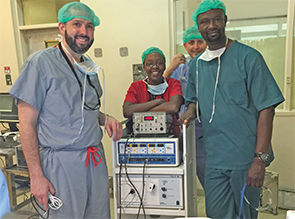
From left: Matthew Bush, MD, Catherine Irungu, MD, John Ayugi, MMED, Paul Radabaugh, MD. This donated facial nerve monitor was the first of its kind at the University of Nairobi.
Courtesy of Matthew Bush, MD
Telling a patient that he needs a full laryngectomy can be tough for any physician. But if the patient and the physician don’t speak the same language, don’t even hail from the same country—let alone the same continent—and the physician is working with limited or nonexistent resources, the conversation can be baffling.
Explore This Issue
June 2016“When you are 3,000 miles away from a monitor, you are doing complex surgery, you have nurses who have never seen what you are doing, and you are making decisions and you are only there for a week, it’s challenging,” said Adam Luginbuhl, MD, an assistant professor of head and neck surgical oncology at Thomas Jefferson University in Philadelphia.
Dr. Luginbuhl tried to explain to his patient’s family that their loved one needed a laryngectomy due to cancer. “We examined the gentleman in the clinic at 8:00 a.m. and proposed to do the surgery later that afternoon,” he said. “I’m working with translators to explain, again and again, that if I don’t do this, the patient will die in the next couple of months,” he added. “In the end, it was really hard for the family to come around, and when we did the surgery, afterwards, they refused to look at me. I learned a lot about offering a life-saving operation with profound implications on someone’s life when [we were] only in the country for seven days and wanted to ensure we were present for postoperative management for at least five of those days. But, years later, the family comes to visit when we come to Haiti, and they hug us all and are so thankful. Our last trip, we brought him an electrolarynx and he charges the battery at the cell phone booths located in the center of the village.”
Dr. Luginbuhl, along with U.S.-based colleagues Joseph Curry, MD, and David Cognetti, MD, developed the Complex Head And Neck Care and Education (CHANCE) program, in which physicians travel twice a year to Hospital Lumière in Bonne Fin, Haiti, and to St. Luke’s Hospital in Port-Au-Prince, Haiti, to perform head and neck surgeries and provide education to their Haitian colleagues. The group started volunteering in the country in 2014.